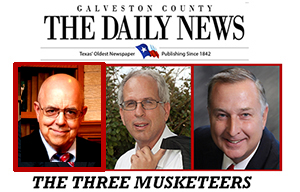

 You Are Here: Home > Galveston Daily News Columns > Ensuring Election Integrity
You Are Here: Home > Galveston Daily News Columns > Ensuring Election Integrity
| Ensuring Election Integrity [Voter ID in Texas] |
GalvDailyNewsMasthead Bill Sargent, Mark Mansius, and John Gay all ran for Congress in the 2012 Republican Primary. They became friends and have been writing weekly columns for the Galveston County Daily News since May 2013. Bill Sargent, Mark Mansius, and John Gay all ran for Congress in the 2012 Republican Primary. They became friends and have been writing weekly columns for the Galveston County Daily News since May 2013. | |
| March 6, 2017 We strongly support making sure every registered voter gets the opportunity to vote. At the same time we want to ensure all those who come to vote can be identified. The Texas voter ID bill was an effort to do both. First it required a photo ID (e.g., a driver’s license, a concealed carry permit, a certificate of citizenship, a passport, etc.). For those individuals who didn’t have one of the acceptable forms of photo ID, the state legislature provided for a free Election Identification Certificate (EIC). In order to get an EIC you needed to have a birth certificate. The state legislature also saw to it that getting a birth certificate was free if the purpose was to get the Election ID. Then an Obama-appointed federal court justice ruled that the Texas law was discriminatory. In the last session those opposed to the Voter ID law said 600,000 people were being disenfranchised by it. In November 2016 (the largest election we’ve ever had) less than 16,500 people statewide voted with one of the federal court’s-imposed alternative IDs, a far cry from the 600,000 figure.
So, under this court order a person with an expired driver’s license from Minnesota was, along with a signed impediment form, allowed to vote a regular ballot. Given this reality, we have some suggestions to help improve this legislation.
Making these modifications would help guard the integrity of the election process while not disadvantaging registered voters. Bill, Mark, and John
|
||